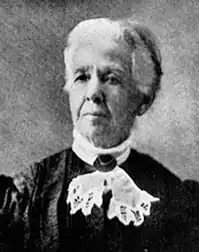Maria Bray
Maria Haskell Herrick Bray (1828–1921), was a 19th-century American writer, editor, and phycologist, best known for being a maritime heroine of an incident during the first days of winter in late 1864.[1]
Maria Herrick Bray | |
|---|---|
 | |
| Born | Maria Haskell Herrick April 25, 1828 |
| Died | June 18, 1921 (aged 93) |
| Occupation(s) | lighthouse keeper and phycologist |
Bray was married to Alexander D. Bray (1818-1885), the lighthouse keeper at Thacher Island Light, off Rockport on Massachusetts' Cape Ann. From December 21 to December 24, 1864, she and her twelve-year-old nephew tended the lights of the station during a winter storm, while her husband was stranded on the mainland, where he had taken an ill co-worker. The Bray family was reunited on Christmas Day.[2]
During her lifetime Bray was recognised as an expert in marine algae.[3] In 1876 Bray exhibited her herbarium collection in the Women's Building at the Centennial Exposition.[4] In 1880 she was described in a French publication as a correspondent with expertise in marine algae.[5] Her collecting expertise was acknowledged by John Robinson in his 1880 book The flora of Essex County, Massachusetts and many of her specimens helped inform his research.[6] Her expertise in marine algae was again recognised by Alpheus Baker Hervey in his 1882 book Sea mosses. A collector's guide and an introduction to the study of marine Algae.[7] Bray was a member of the Essex Institute, hosted meetings at her residence and guided members in a botanical field trip.[8] She was acknowledged in an obituary of Frank Shipley Collins' as helping inspire his interest in algae.[9]
In 2000, the United States Coast Guard named a coastal buoy tender, USCGC Maria Bray, in her honor.[10]
References
- "Cape Ann (Thacher Island) Lighthouse". LighthouseFriends. Retrieved 2023-04-07.
- "MARIA BRAY THACHER ISLAND LIGHTHOUSE KEEPER DECEMBER 21-24, 1864". www.uscg.mil. 2000. Archived from the original on 24 August 2000. Retrieved 7 April 2023.
- Dexter, Ralph W. (1986). "Two centuries of naturalists on Cape Ann, Massachusetts". Essex Institute Historical Collections. 122 (3): 249 – via Internet Archive.
- Vasey, George (1876). "Botany at the Centennial". Field and Forest. 1: 142.
- Correspondance botanique liste des jardins, des chaires, des musées, des revues et des sociétés de botanique du monde (in French). Liège [Belgique]: A la Boverie. 1880. p. 104. doi:10.5962/bhl.title.60020. ISBN 978-0-665-54675-4.
- Robinson, John (1880). The flora of Essex County, Massachusetts. Salem: Essex Institute. doi:10.5962/bhl.title.55536.
- Hervey, A. B. (1882). Sea mosses. A collector's guide and an introduction to the study of marine Algae. Boston: S. E. Cassino. doi:10.5962/bhl.title.56801.
- "The Retrospect of the Year". Bulletin of the Essex Institute. 20: 119. 1888 – via Biodiversity Heritage Library.
- Setchell, W. A. (1925). "Frank Shipley Collins 1848-1920". American Journal of Botany. 12 (1): 54–62. ISSN 0002-9122.
- "Coast Guard Cutter Maria Bray". Ranger Coin Store. 2021-11-12. Retrieved 2023-04-07.